TRAINING OPPORTUNITIES
TRAININGS
PacVec shares training opportunities in vector-borne disease science provided by our partners and affiliations. Explore the current opportunities:
WEBINARS AND SEMINARS
 PacVec holds monthly seminars that convenes public health and vector control professionals, and features the work of PacVec’s principal investigators, trainees, and visiting researchers that are relevant to the center’s mission. Seminars are held monthly during the academic year from October through June and are available both in-person and via Zoom. To be notified about upcoming seminars, please sign up for our mailing list by clicking subscribe. All seminar announcements include a link to participate remotely via Zoom.
PacVec holds monthly seminars that convenes public health and vector control professionals, and features the work of PacVec’s principal investigators, trainees, and visiting researchers that are relevant to the center’s mission. Seminars are held monthly during the academic year from October through June and are available both in-person and via Zoom. To be notified about upcoming seminars, please sign up for our mailing list by clicking subscribe. All seminar announcements include a link to participate remotely via Zoom.
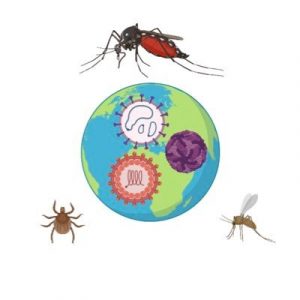 Join the 4th International Virtual Seminars on arbovirus biology every third Thursday of the month between October 2023 and July 2024! To register for a Zoom link, email Tuli Mukhopadhyay, Tem Morrison, or Clive McKimmie. View flyer here.
Join the 4th International Virtual Seminars on arbovirus biology every third Thursday of the month between October 2023 and July 2024! To register for a Zoom link, email Tuli Mukhopadhyay, Tem Morrison, or Clive McKimmie. View flyer here.
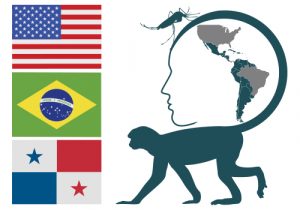 The Virtual Seminar Series on Vector-Borne and Zoonotic Diseases, organized by Kathryn Hanley and Nikos Vasilakis will be hosted every second Tuesday of the month at 9 AM PDT/PST from September 2023 to August 2024. Please register in advance for this series.
The Virtual Seminar Series on Vector-Borne and Zoonotic Diseases, organized by Kathryn Hanley and Nikos Vasilakis will be hosted every second Tuesday of the month at 9 AM PDT/PST from September 2023 to August 2024. Please register in advance for this series.

VIEW SERIES
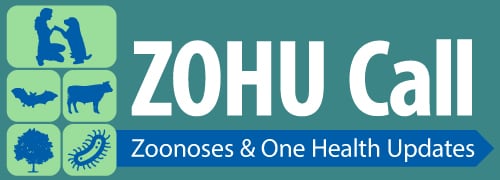 Zoonoses & One Health Updates (ZOHU) Calls are one-hour monthly webinars that provide timely education on zoonotic and infectious diseases, One Health, antimicrobial resistance, food safety, vector-borne diseases, recent outbreaks, and related health threats at the animal-human-environment interface.
Zoonoses & One Health Updates (ZOHU) Calls are one-hour monthly webinars that provide timely education on zoonotic and infectious diseases, One Health, antimicrobial resistance, food safety, vector-borne diseases, recent outbreaks, and related health threats at the animal-human-environment interface.
- Free Continuing Education for a variety of public health, animal health, and human health professionals. Participants can earn CME, CNE, CEU, CECH, CPH and AAVSB/RACE. Each call is recorded and available online for those unable to attend live sessions.
- Contact us if you have questions or suggestions for future topics.
- Subscribe to the monthly ZOHU Call News and Updates email newsletter.
 Archived webinars and presentations are available for ‘members-only’ viewing here.
Archived webinars and presentations are available for ‘members-only’ viewing here.
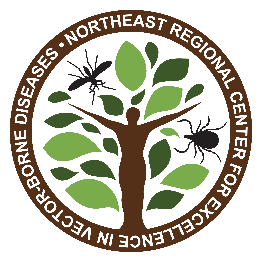 NEVBD is pausing their in-person component of the Vector Biology Boot Camp for the time being, with the hopes of offering it again in 2023. In lieu of their hands-on program, you can access recorded presentations from the 2021 Virtual Vector Biology Boot Camp available through the Cornell Video on Demand service. Simply complete this user registration form or visit their website to gain access to these recordings.
NEVBD is pausing their in-person component of the Vector Biology Boot Camp for the time being, with the hopes of offering it again in 2023. In lieu of their hands-on program, you can access recorded presentations from the 2021 Virtual Vector Biology Boot Camp available through the Cornell Video on Demand service. Simply complete this user registration form or visit their website to gain access to these recordings.
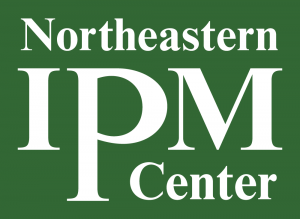 A new series in the Northeastern IPM Center “The IPM Toolbox” webinar series is focusing on tick integrated pest management strategies.
A new series in the Northeastern IPM Center “The IPM Toolbox” webinar series is focusing on tick integrated pest management strategies.

 As part of Penn State Extension’s efforts to educate and share information, educators hosted a 10-part webinar series on ticks and disease prevention from July 9 through September 17, 2020. The webinars were recorded for later viewing and are available at http://extension.psu.edu/tick-webinars.
As part of Penn State Extension’s efforts to educate and share information, educators hosted a 10-part webinar series on ticks and disease prevention from July 9 through September 17, 2020. The webinars were recorded for later viewing and are available at http://extension.psu.edu/tick-webinars.
PROFESSIONAL DEVELOPMENT AND TRAININGS
 The United States National Tick Collection in the James H. Oliver, Jr., Institute for Coastal Plain Science is offering the “5th Annual Tick Workshop” at Georgia Southern University (Statesboro, GA). Topics covered include: Tick systematics, identification, classification, population genetics, phylogeography (morphological and molecular taxonomy); tick ecology, behavior; field collecting experience; tick anatomy, physiology; and, more. Registration fee is $1,450.00 (includes: lodging, workshop supplies/materials) and a $5.00 fee if applicable. Workshop will be from June 16th to June 29th, 2024.
The United States National Tick Collection in the James H. Oliver, Jr., Institute for Coastal Plain Science is offering the “5th Annual Tick Workshop” at Georgia Southern University (Statesboro, GA). Topics covered include: Tick systematics, identification, classification, population genetics, phylogeography (morphological and molecular taxonomy); tick ecology, behavior; field collecting experience; tick anatomy, physiology; and, more. Registration fee is $1,450.00 (includes: lodging, workshop supplies/materials) and a $5.00 fee if applicable. Workshop will be from June 16th to June 29th, 2024.
 The California Association of Public health Laboratory Directors (CAPHLD) is offering Public Health Microbiologist (PHM) training. The mission of the CAPHLD is to improve and protect public health through the promotion and advancement of public health laboratory practice. If you have questions regarding PHM training, please email the PHM training committee at PHMtrainingupdate@gmail.com. Emails are not checked daily, so please be patient in waiting for a response to your question(s).
The California Association of Public health Laboratory Directors (CAPHLD) is offering Public Health Microbiologist (PHM) training. The mission of the CAPHLD is to improve and protect public health through the promotion and advancement of public health laboratory practice. If you have questions regarding PHM training, please email the PHM training committee at PHMtrainingupdate@gmail.com. Emails are not checked daily, so please be patient in waiting for a response to your question(s).
 SECVBD, along with partners in the University of Florida’s Institute of Food and Agricultural Sciences, is pleased to provide an online course in mosquito training for pest managers. Participants who complete the 11 modules in the course will learn to identify and understand the mosquitoes of major importance in the urban environment, their life cycles, the general methods of control, personal protective equipment required for safe insecticide application, and the laws and regulations governing mosquito control for the urban pest management industry. CEUs have been approved for FL, SC, AL, CO, and CA at this time.
SECVBD, along with partners in the University of Florida’s Institute of Food and Agricultural Sciences, is pleased to provide an online course in mosquito training for pest managers. Participants who complete the 11 modules in the course will learn to identify and understand the mosquitoes of major importance in the urban environment, their life cycles, the general methods of control, personal protective equipment required for safe insecticide application, and the laws and regulations governing mosquito control for the urban pest management industry. CEUs have been approved for FL, SC, AL, CO, and CA at this time.
![]()
- Course: Biology of Mosquitoes, Ticks, and Other Disease-Causing Arthropods
- Overview: This certificate course provides an overview of the biology of arthropods — both insects and related forms — that impact human health. You will explore the fascinating biology, behaviors, and disease-transmission processes of a range of organisms, with special emphasis on the most important groups, including ticks and mosquitoes. You will also learn about specific diseases associated with these vectors that can be passed on to humans.
- Who Should Take the Course: Appropriate for those working in healthcare and vector-borne disease control, those who train and supervise outdoor workers, and students of vector biology who may not have access to other courses on this topic.
- Commitment: 5-7 hours per week over a four week program
- Website: https://ecornell.cornell.edu/custom/biology-of-mosquitoes-ticks-and-other-disease-causing-arthropods/
- Cost: $399
 The Entomological Society of America (ESA) Certification Corporation offers several certification programs for professionals who work with insects:
The Entomological Society of America (ESA) Certification Corporation offers several certification programs for professionals who work with insects:
- Certified Integrated Pest Management Technician (CIT)
- Public Health Entomology Certificate
- Board Certified Entomologist
- Associate Certified Entomologist
- Associate Certified Entomologist (International)
 The e-modules cover basic mosquito biology, surveillance and control with an emphasis on Aedes aegypti and Aedes albopictus. The online training is available for free for both members and non-members.
The e-modules cover basic mosquito biology, surveillance and control with an emphasis on Aedes aegypti and Aedes albopictus. The online training is available for free for both members and non-members.
This is a no-cost, 11-course learning series developed by the Centers for Disease Control and Prevention and partners. The program emphasizes the use of integrated pest management (IPM) to address public health pests and vectors that spread disease.

UPCOMING MEETINGS
 The Society for Vector Ecology (SOVE) is hosting their 52nd annual conference at Fort Collins Marriott in Fort Collins, Colorado between September 15-19, 2024. Call for presentation abstracts are open. Please submit abstracts here by April 19th.Visit their website for more information about the conference.
The Society for Vector Ecology (SOVE) is hosting their 52nd annual conference at Fort Collins Marriott in Fort Collins, Colorado between September 15-19, 2024. Call for presentation abstracts are open. Please submit abstracts here by April 19th.Visit their website for more information about the conference. 
The Entomological Society of America (ESA) Annual Meeting 2024 will take place on November 10-13, 2024 in Phoenix, Arizona. Join thousands of insect science professionals in person as they meet, share ideas and advance scientific and technical knowledge. Forge new friendships and create lasting memories with fellow entomologists who share your passion for insects and their vital role in our ecosystem. Grow together as a community and leave with renewed energy, new ideas, and new connections. Explore the latest research in our poster hall and attend abstract presentations across all disciplines of insect science.
 MVCAC has opened registration and hotel booking for the 93rd Annual MVCAC Conference & Exhibitor Showcase taking place January 26-29, 2025 at the Oakland Marriott. Make sure to get your Early Bird registration rates and secure you hotel room.
MVCAC has opened registration and hotel booking for the 93rd Annual MVCAC Conference & Exhibitor Showcase taking place January 26-29, 2025 at the Oakland Marriott. Make sure to get your Early Bird registration rates and secure you hotel room. Accommodations
Stay at the Oakland Marriott City Center
Guests are also welcome to call the hotel reservations at (510) 451-4000; mention you are with MVCAC to get the contracted group rate of $234 if rooms are available in your room block.
- Reservation Cut-Off Date: December 26, 2024, or once the room block fills up, whichever comes first
- Hotel Cancellation: Please refer to your hotel confirmation for cancellation policies; MVCAC policy is that the one-night deposit will not be refunded unless approved by MVCAC staff
- Parking: Self-parking is discounted to $35 a night (subject to change)
93rd Annual MVCAC Conference Call for Papers are Open!
The theme for the 93rd Annual MVCAC Conference is “Vector Control- A path to a more hospitable world”. The prime topics for consideration are below but please consider submitting even if your paper does not fit into one of these topics. All submissions will be considered. The deadline for submission is October 4, 2024. Requests made following this date may not be honored and may not appear in the conference program. Learn More. Questions? Please reach out to Senior Meeting Manager, Rachel Hickerson at rhickerson@amgroup.us.
ADVERTISEMENTS
Need help advertising a training opportunity or an upcoming meeting? Contact us!
SUBSCRIBE
Interested in online webinars, and professional development and trainings? Subscribe to our newsletters to receive weekly updates on training opportunities.
The Pacific Southwest Regional Center of Excellence in Vector-Borne Diseases is supported through Cooperative Agreement Number 1U01CK000649 between the Centers for Disease Control and Prevention (CDC) and the University of California, Davis.
© 2024 – All rights reserved